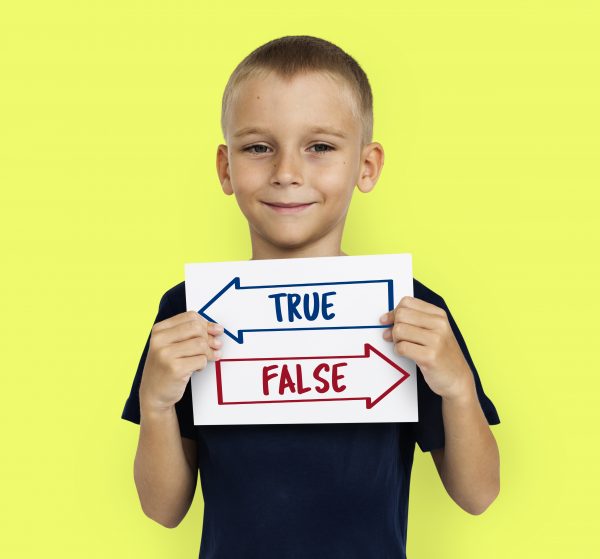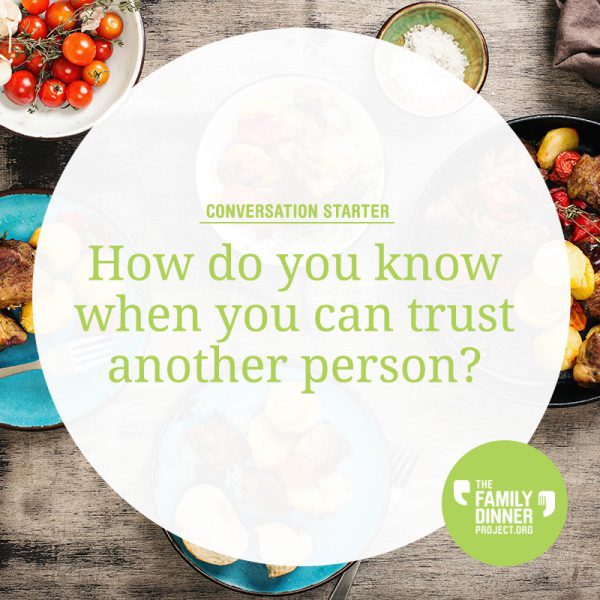Newsletter: February 2020
Encouraging Honesty and Trust at Family Dinner

With the increasing flow of deepfakes, online hoaxes, and controversies about what’s “real news” and what isn’t, it can feel like we’re living in a time when honesty is a hard thing to find. But we believe that the majority of people still care deeply about honesty. We all want to raise kind, empathetic and trustworthy kids, and to model those qualities ourselves. The family dinner table is one regular opportunity we have for encouraging honesty and trust.
Don’t worry — you don’t have to climb on a soapbox to use family dinner as a place to strengthen trust! Food, fun and conversation can all be part of encouraging qualities that matter to us. Here are some ways to build the “honesty muscle” at mealtimes:
- Let kids hear you being truthful and accountable.
As parents, we often have the impulse to hide our mistakes so our kids can continue to see us as heroes and role models. But we can still be role models — probably even more powerful ones! — if we let our flaws show. Tell stories about your day or from your past that include examples where you weren’t totally truthful and had to learn to own up, or where you had to immediately be honest and take responsibility for a mistake, even if the consequences were unpleasant. - Encourage honesty about the little things.
Family mealtimes can be filled with small ways in which we unintentionally set kids up to be dishonest. Read our post on “Feeding Falsehoods” to see if you can identify with any of them — and remember that it’s better in the long run to have a kid who feels comfortable enough to tell you that they don’t like their meal than it is to have a kid who’s scared of being up front with you. - Keep calm.
In order to build trust, it’s important to help everyone feel secure in what the reaction will be when there’s a mistake. It’s easy to overreact to common dinnertime pitfalls like spilled milk or sibling squabbles, but children who learn that making a mess leads to yelling and punishment may try to hide their mistakes — both at, and away from, the dinner table. Instead of letting anger get the best of you, try to take a deep breath and say something like “Oops! That made a mess, didn’t it? Let’s see if we can get that cleaned up. You go grab the paper towels.” - Ask questions about what you’re hearing.
Especially as kids get older, it can be crucial to help them identify and label truths, half-truths and untruths. When they share the latest piece of gossip from school or tell you about something a friend said that doesn’t quite seem right, ask questions to help them decide what’s trustworthy information and what isn’t. “That’s interesting. Where did you hear that?” is a good opener. You can follow up with other questions like “Hm…what do you think about that? Do you think it seems like something that really happened?” or “Wow – a lot of people seem to have shared that story. I would be curious to know where it started. Do you have any idea?”
Unfortunately, the rise of social media and online platforms has made it increasingly tricky for kids (and adults) to figure out what’s true and what isn’t. It’s important to do our best to help our families develop good critical thinking skills and to learn to value sorting out fact vs. fiction. We hope that some of these ideas will help you use your mealtimes to make honesty and trust a regular topic for your family.
Family of the Month
Meet the Miller family! Tori is a parent educator with the Military Child Education Coalition, so she not only knows a thing or two about family dinners — she teaches others how to improve their own.
Real Family Dinner Projects: The Miller Family
Food

Trust us: This one-pan dinner is budget-friendly, delicious and light on the dishes!
Sheet Pan Roasted Chicken Legs and Vegetables
Fun

Put a fun twist on the concept of honesty with a game of “Two Truths and a Tall Tale!”
Conversation

See what your family thinks about honesty and trust with these conversation starters.
Recent Newsletters
- Ask The Family Dinner Project - February 2026
- Warming Up Winter - January 2026
- Home, and Homemade, for the Holidays - December 2025
- Thanksgiving Traditions, Old and New - November 2025
- Food as Comfort and Care - October 2025
- The State of Family Dinner - September 2025
- Back to School Dinner Success - August 2025
- What’s Your Meal Planning Personality? - July 2025
- A New Guide to Gathering - June 2025
- Celebrating 15 Years of The Family Dinner Project - May 2025
- New Research: Family Dinners Boost Happiness - April 2025
- Just the Two of Us - March 2025
